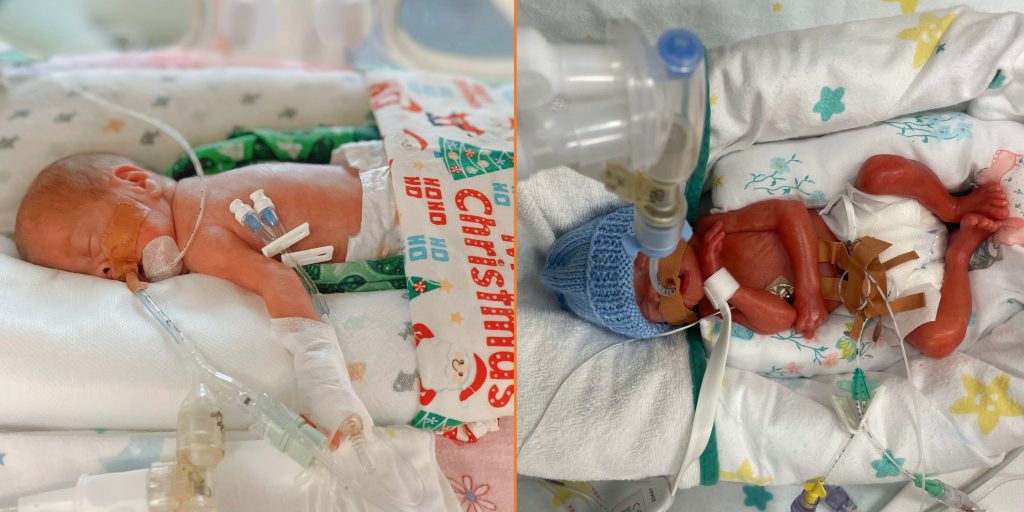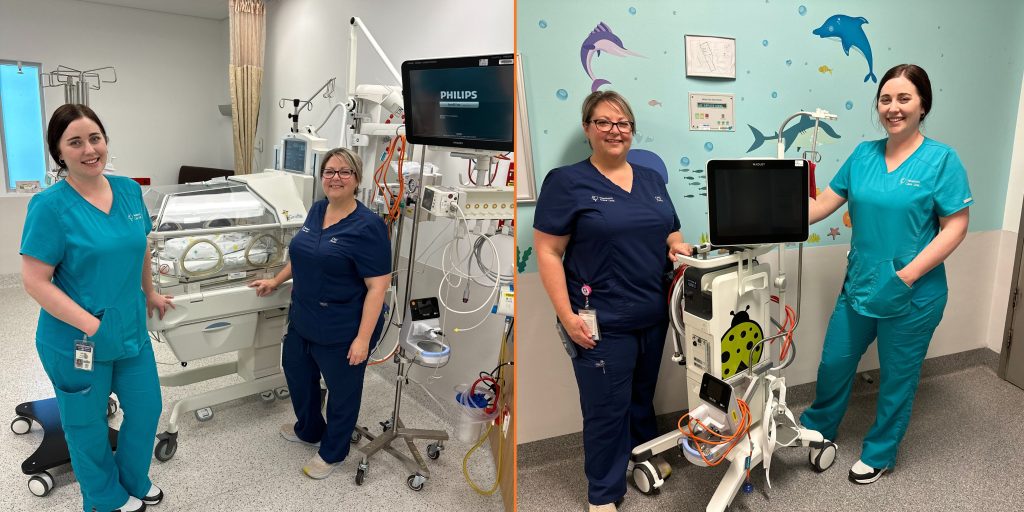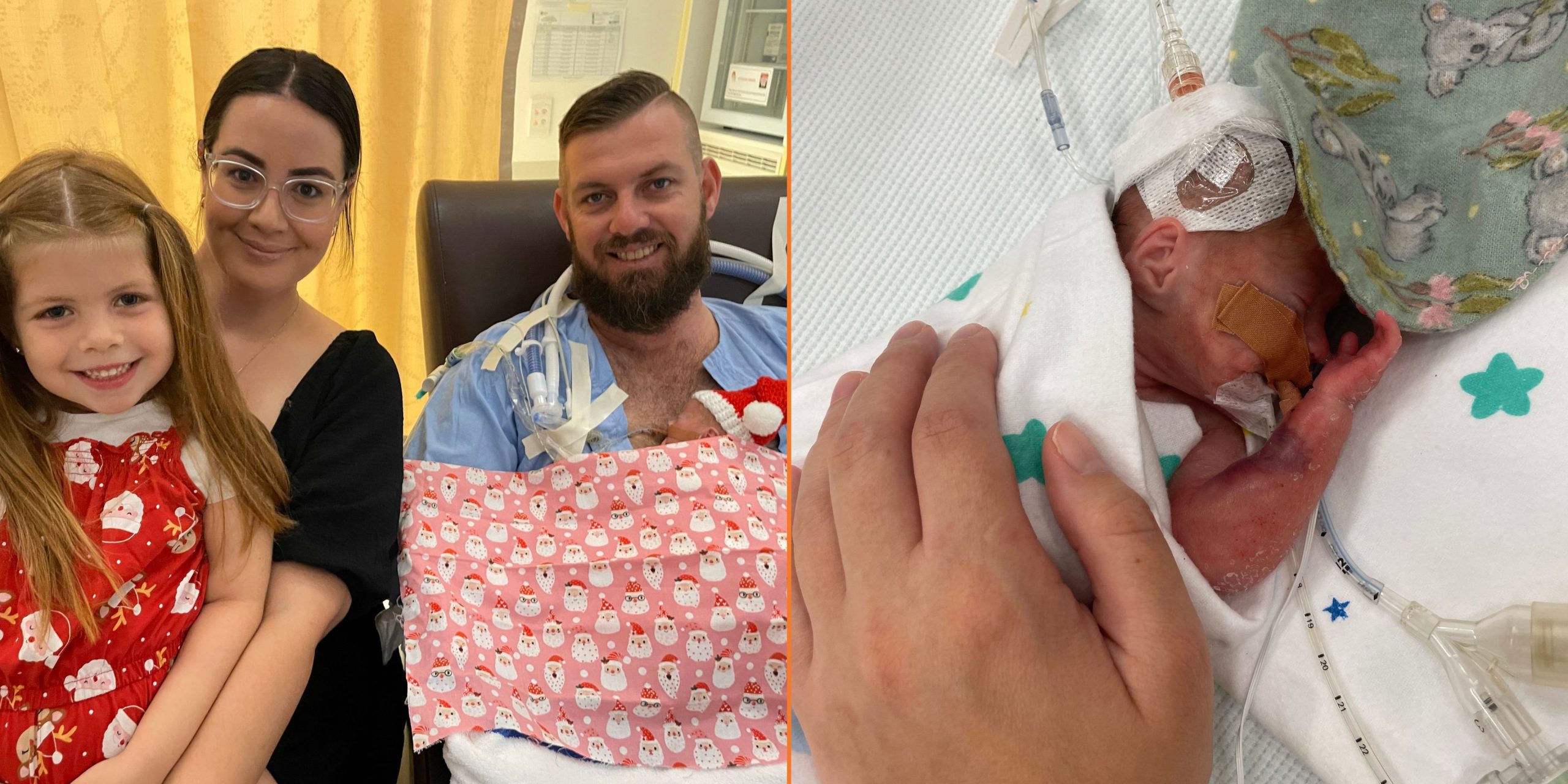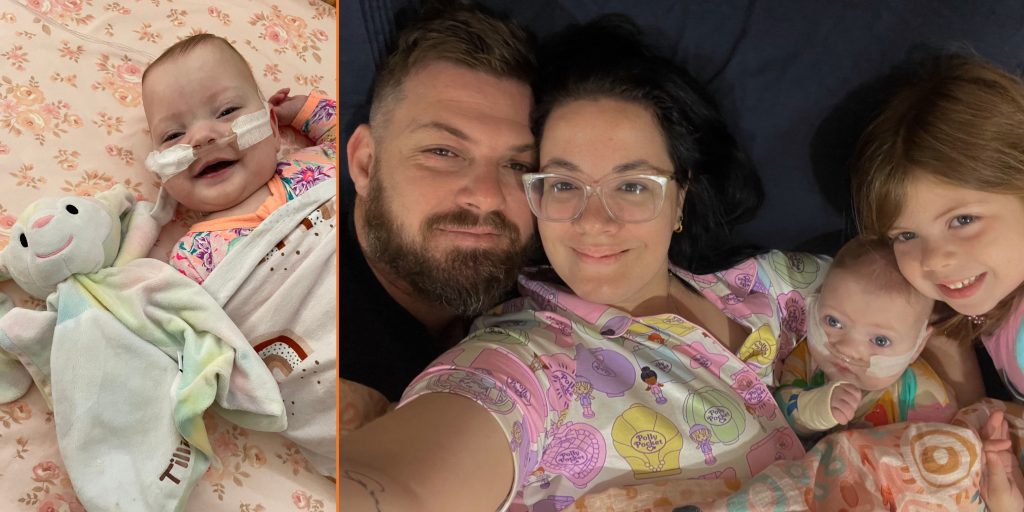Nov, 2024
Born at 24 weeks, baby Tillie had to fight hard to stay alive.
Ashleigh vividly recalls the fateful day she went into preterm labour. At 24 weeks, she felt a rush of excitement, believing she had crossed into a safer phase of her pregnancy. “I remember that morning I was so excited because I thought that was the safe zone,” she says. “I thought, ‘I have to take a bump photo to celebrate.’” But that excitement quickly turned to terror as she experienced unexpected bleeding at work. On the drive to the hospital, pain intensified, sharper and more frightening than before. Even though she was familiar with the hospital, panic clouded her mind, as she tried to make her way to the hospital from the carpark, disorientated and sight blurry through tears.
“I didn’t know where I was or where I was going,” she recalls, her voice heavy with emotion. “I was crying so much. A lovely lady asked if I was okay and walked me to the maternity assessment centre.”
In that assessment room, the urgency became palpable as doctors swiftly recognised the grave situation. Ashleigh’s membranes had severely bulged, heightening the risk of premature birth, and she was rushed to the birth suite. “The doctors were coming at me from all sides, trying to stop the contractions, giving me magnesium for her brain, steroids for her lungs—everything was happening so fast.” Then, neonatologists entered, preparing her for what life would look like with a baby born so prematurely.
The experience felt like a surreal nightmare. Reflecting on that moment, Ashleigh says, “I thought it was going to be like every other time when I had some bleeding—just a bit of a scare. But everything changed in an instant.”

Two harrowing days later, Tillie was born—tiny, vulnerable, and facing unimaginable challenges. Weighing just 728 grams, she was barely larger than her mother’s hand. Those early days were filled with uncertainty: Was there a brain bleed? Did she have a hole in her heart? Was she developing chronic lung disease? Each day, Ashleigh and her husband, Anthony, clung to fragile moments of hope amid a storm of fear, trusting the NICU team’s unwavering skill and dedication.
“I knew babies were born prematurely and could survive, but I had no idea what they went through,” Ashleigh confesses. “I had no idea what goes into keeping them alive.”
The Gold Coast Hospital Foundation plays a crucial role in providing life-saving equipment and vital services that give families like Tillie’s hope and the chance to heal. During her stay, Tillie relied on many pieces of equipment donated by the Foundation, including the Servo N Ventilator, Giraffe Omni Bed, Kanmed Bed, and Transcutaneous Carbon Dioxide (TcCO2) Monitor.

Dr. Joseph Tauro, one of the dedicated Neonatologists at Gold Coast University Hospital, played a significant role in Tillie’s journey. Ashleigh and Anthony are deeply grateful for his unwavering commitment to Tillie’s life-saving care.
“I remember with Tillie, the first major conversation with Ashleigh and Anthony was when she was unwell. She had been intubated, had difficult IV access, and experienced an extravasation in her hands. I had to insert a central line through a little vein in her scalp. Parents hold on to hope, but extreme preterm babies face the highest risks among all our admitted patients. They are vulnerable to infections, lung disease, intraventricular bleeds, necrotising enterocolitis, and retinopathy of prematurity. Each baby is different and may have one or more of these complications.” Said Dr. Tauro.
Initially, Tillie went through what is known as a “honeymoon period,” when premature babies experience a brief surge of stability before complications arise. “They warn you about the honeymoon period,” Ashleigh says, “but nothing prepares you for when it hits the fan.” That dreaded moment came at around 2 weeks of age, when doctors suspected necrotizing enterocolitis, a life-threatening intestinal inflammatory condition which can be fatal. “As soon as I heard the words, I thought she was going to die,” Ashleigh admits. She was diagnosed with a bacterial infection which was treated with antibiotics and was able to tolerate feeds slowly.
Tillie fought valiantly against the infection, but further complications loomed. Her fragile veins made administering life-saving treatments an agonising challenge. In a devastating twist, there was an extravasation from the Total Parenteral Nutrition (TPN) which caused bruising and swelling in her tiny arm. “Her arm went black,” Ashleigh recalls, horror etched in her memory. “It was terrifying—she almost lost her arm.”
A particularly heartbreaking moment struck Ashleigh as she contemplated Tillie’s future. “I bought the storybook ‘10 Little Fingers and 10 Little Toes’ by Mem Fox for Christmas,” she recalls. “And I remember thinking, if she needs her arm amputated, I can’t give her that.” Once again, Tillie defied all odds and her dedicated medical team was able to save her arm.

For Ashleigh, navigating life with a critically ill baby felt indescribable. She and Anthony found themselves thrust into a world of medical terminology and procedures they had never imagined encountering. For 10 long months, they watched as machines and monitors kept Tillie alive, their anxiety a constant companion. Whenever Tillie was stable enough to hold, Ashleigh would forgo eating or drinking, driven by a desperate need to cradle her baby for as long as possible. “It’s so hard because you’ll never understand unless you live it,” she reflects.
Balancing the relentless fear of losing Tillie while trying to maintain a semblance of normalcy for their five-year-old daughter, Kobie, proved to be a formidable challenge. “The stress, the fear of losing a baby, constantly—while trying to keep things normal for another child—it’s so tricky to balance. Kobie’s friends spend their weekends at the beach, chilling at home, or going to Dreamworld, and I’m bringing her to the hospital,” Ashleigh shares, her voice heavy with the weight of that duality.
After 303 long days in the hospital, Ashleigh and Anthony finally brought Tillie home, just in time to embrace the magic of Christmas together. Yet, Ashleigh felt a swirl of excitement, disbelief, and anxiety as she pondered what their new normal would look like as a family of four, finally under the same roof. “It felt surreal, almost illegal, like I shouldn’t be allowed to leave with her,” she admits, a mixture of joy and trepidation.

Last Christmas, they celebrated in the hospital, their family still incomplete. “It was hard trying to create Christmas magic at home for Kobie, knowing that a part of our family wasn’t home with us,” she recalls wistfully. As she reflects on their cherished traditions, Ashleigh adds, “The last few years, we’ve been spending Christmas at the Spit, except for last year. I’m not sure what the beach will look like with Tillie on oxygen, but we’ll cross that bridge later.” Christmas Eve holds a special place in Ashleigh’s heart. “We go light looking, and there’s just that magic in the air. You’ve got cookies and carrots out for Santa and his reindeer and the matching pyjamas—that’s my favourite part. We’ll be doing that, for sure.”
While they were overjoyed to be home, Ashleigh and Anthony knew that their challenges were far from over. Tillie’s journey would require ongoing medical care, with visits to cardiologists, physios, O.T’s, and specialists all vital to her progress.
Through it all, Ashleigh feels an overwhelming gratitude for the doctors and nurses who stood by Tillie and her family every step of the way. “They have literally saved my baby’s life more times than I can count,” she reflects, describing the staff’s dedication and compassion as essential not only for Tillie’s survival but also for their own strength and comfort during the darkest times. The NICU staff became like family, offering explanations, reassurance, and even a shoulder to lean on through each setback and small victory. “We wouldn’t be here without them,” Ashleigh says.
This Christmas, your support can help ensure that those in critical need, like Tillie, receive the best possible health care. Every dollar raised stays right here on the Gold Coast, helping to fund vital medical equipment and services that enhance patient care and experiences and improve patient outcomes.
You can help make a difference by supporting our Christmas appeal. Your donation could be the difference to the life of someone you know.
